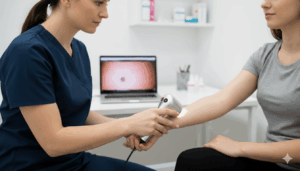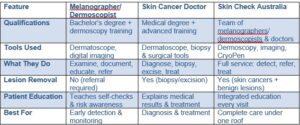Training, Qualifications and How They Differ from Skin Cancer Doctors.
When it comes to protecting your skin, you may have heard the term ‘melanographer/dermoscopist’. But what exactly does it mean and how do they differ from a skin cancer doctor?
At Skin Check Australia, we believe in transparency — making sure you know who is examining your skin, why they’re qualified and how this teamwork helps detect skin cancer earlier.

What is a Melanographer/Dermoscopist?
A melanographer/dermoscopist is a health professional trained in the use of a dermatoscope — a handheld device that magnifies and illuminates the skin, revealing structures invisible to the naked eye. This advanced imaging helps identify early warning signs of melanoma and other skin cancers before they become visible.
Dermoscopy professionals are often:
- Dermal therapists with skin cancer detection training
- Registered nurses specialising in skin checks
- Clinicians with qualifications in dermoscopy and lesion monitoring
Training and Qualifications
Dermoscopy requires specialised training and ongoing education. Common pathways include:
- Accredited dermoscopy courses (offered by skin cancer colleges, universities or medical bodies)
- Clinical training under supervision in skin imaging and lesion monitoring
- Continuing education in melanoma detection and technology updates
At Skin Check Australia, many of our melanographers hold university-level qualifications in nursing, dermatology support or dermal therapy, ensuring a strong clinical foundation.
Melanographer/Dermoscopist vs. Skin Cancer Doctor
While both melanographers/dermoscopists and skin cancer doctors play vital roles, their responsibilities differ:
Melanographer/Dermoscopists
- Hold a bachelor’s degree and specialised dermoscopy training
- Use dermoscopy and digital imaging to identify and document suspicious lesions
- Provide patient education on self-checks and skin health
- Refer to skin cancer doctors for diagnosis or treatment if a lesion is concerning
- Do not perform biopsies, surgery or prescribe treatments
Skin Cancer Doctors
- Hold a medical degree with advanced training in skin cancer medicine or dermatology
- Can formally diagnose and treat skin cancers
- Perform biopsies, excisions and surgical procedures
- Manage ongoing patient care and treatment follow-up
Why Choose Skin Check Australia?
At our clinics, you get the best of both worlds — the precision of melanographer/dermoscopists and the medical expertise of skin cancer doctors.
- Qualified professionals: Trained melanographer/dermoscopists and experienced doctors working together
- Early detection: Subtle changes spotted using advanced dermoscopy and imaging
- On-the-spot care: Immediate doctor referral within the clinic, avoiding delays
- Removal of benign lesions: Safe removal of skin tags, keratoses and other harmless spots with tools like the CryoPen
- Patient education: Every patient leaves knowing how to monitor their skin between checks
Quick Comparison
Final Takeaway
A melanographer/dermoscopist is not a doctor, but a highly trained professional who plays a crucial role in early detection. When paired with a skin cancer doctor’s expertise, you get a comprehensive, seamless service — from detection to treatment.
That’s why choosing Skin Check Australia means smarter, faster and more effective protection for your skin.


